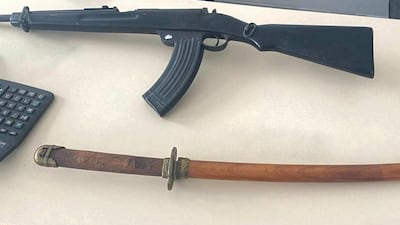More than 900 weapons and pieces of ammunition were seized after a global crackdown on gun traffickers.
A joint operation by police forces across Europe led to more than 42,000 parcels checked for weapons.
Six firearms, 13 firearms parts, 600 items of ammunition and 297 other weapons, including knives, pepper spray and Tasers, were seized.
In Operation Armstrong VII police and customs authorities from 26 countries united, with the international co-ordination supported by crime agency Europol and the European Commission.
"The use of fast parcels or parcel mail has been identified as a key modus operandi for firearms trafficked to and within the EU," Europol said.
"Europol has been actively involved from the onset of this operation by collecting intelligence from all participating partners on firearms and ammunition seized from postal packages from November 2019 until October 2020.
"This intelligence was used as input to identify risk indicators that were shared with law enforcement to prioritise checks and identify packages possibly containing firearms or firearms-related commodities."
The operation targeted the trafficking of firearms to and within the EU through post and courier services. Police and customs authorities in the participating countries carried out enhanced controls of suspicious parcels and postal shipments after months of surveillance of dark web transactions.
"During the action week, Europol set up a virtual command centre and provided a platform for real-time information sharing and cross-checking of intelligence, creating a communication network involving police and custom authorities," the crime agency said.
"Information collected and shared during the action days will be processed and analysed in the post-operational phase, during which concerned countries will be duly informed about any relevant outcomes."
Europol said criminals exploited the differences in legislation in various countries, whereby firearms or firearms components restricted in one country can be ordered easily and openly from another through the internet.
As a result, firearms are frequently traded on online platforms, including dark web marketplaces.
"This development has resulted in a significant increase in the use of parcel and postal services to traffic firearms and firearm components," Europol said.
"With millions and millions of parcels crossing the borders, finding the particular shipments containing firearms and other prohibited items constitutes a sizeable challenge for police and customs and other law enforcement authorities across Europe.
"In this endeavour, the key success-defining factor is intelligence: knowing what to look for and where and when they'd arrive based on emerging new trends. This can only be achieved through active and continuous operation between police and customs and the private industry, including post and express courier services."
Countries involved included the UK, Germany, the US and the Netherlands.


